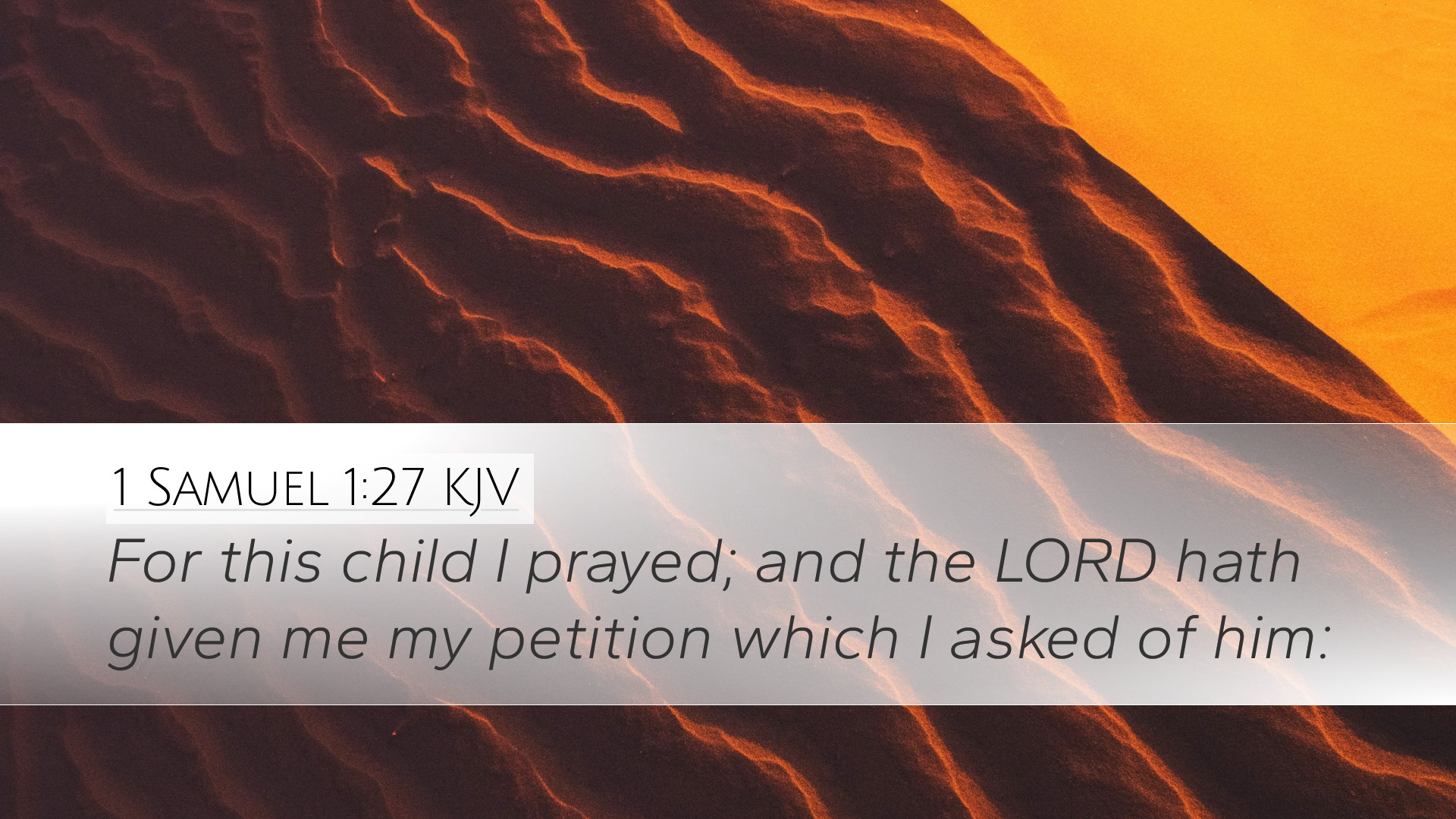Commentary on 1 Samuel 1:27
Verse Context: "For this child I prayed; and the LORD hath given me my petition which I asked of him." - 1 Samuel 1:27
Introduction
This verse is nestled within the narrative of Hannah, a deeply distressed woman longing for a child. Her fervent prayers and vows to God reflect a profound relationship with the Divine, one marked by both desperation and faith. When her prayers are answered, her response is not merely thankfulness, but a declaration of God’s faithfulness. This commentary seeks to unfold the rich implications of Hannah’s words, drawing insights from public domain sources to enrich our understanding.
Insights from Matthew Henry
Renowned for his eloquent exposition, Matthew Henry emphasizes the importance of prayer in this passage. He notes that Hannah's prayer was not a mere formal request; it was a deep cry of the heart. She recognized that the blessing of a child was a divine gift, rooted in God’s sovereign will.
- The Nature of Hannah's Prayer: Henry asserts that Hannah’s prayer was characterized by fervency and sincerity. It exemplifies how believers should approach God – not with vain repetition but with heartfelt supplication.
- God's Faithfulness: Henry points out that Hannah’s acknowledgment of receiving her petition highlights God's responsiveness to the faithful prayer of the righteous. Her statement reflects a testimony of God’s goodness.
- The Significance of the Child: In Hannah’s context, the child she prayed for would not only fulfill her personal desires but would ultimately play a pivotal role in Israel’s history as the prophet Samuel.
Insights from Albert Barnes
Albert Barnes provides additional perspectives on this verse by emphasizing the connection between prayer and divine response. He explains that Hannah’s situation illustrates the principle that God often delays responses to prayer to strengthen our faith.
- Practical Implications of Prayer: Barnes discusses the nature of petitionary prayer, arguing that it reveals our dependence on God. Hannah’s persistent prayer is an example for believers to remain steadfast, regardless of circumstances.
- A Testimony of Grace: He comments on the notion of grace in God’s gifts. The birth of Samuel was not simply a result of Hannah's praying but a gracious act from a merciful God.
- Theological Reflection: The verse communicates the theme of God’s providence. This highlights that God’s plans often encompass more than individual desires, serving larger divine purposes.
Insights from Adam Clarke
Adam Clarke, with his theological richness, delves into the emotional backdrop of Hannah’s statement. He highlights the juxtaposition of sorrow and joy—illustrative of the human experience in relation to God’s providence.
- The Emotional Journey: Clarke perceives Hannah’s journey from despair to joy, emphasizing that her prayer was an expression of her internal struggle, which is relatable to many Christians facing trials.
- The Significance of Vows: He also reflects on the implications of her vow to dedicate Samuel back to the Lord, suggesting that Hannah understood the child as belonging to God and seen as a vehicle of God’s plans for Israel.
- Encouragement for Believers: Clarke concludes with encouragement for believers, asserting that God hears and answers prayers, urging them to approach Him with expectant faith.
Theological Implications
The commentary on this verse unfolds several theological implications crucial for pastors and theologians:
- Intercession and Divine Will: Prayer serves as a means of aligning human intentions with the divine will. Hannah’s experience reaffirms that earnest prayer can lead to significant divine outcomes.
- Understanding Divine Timing: The narrative invites reflection on God’s timing and providence in responding to prayer, suggesting that delays are often part of God's perfect plan.
- Faithfulness of God: The text reinforces the theological affirmation of God as faithful to His promises, encouraging believers to remain persistent in their petitions.
Conclusion
1 Samuel 1:27 encapsulates a profound moment of realization and gratitude that emerges from persistent prayer. Hannah’s declaration not only marks the personal fulfillment of her deep longing but also serves as a theological narrative about the nature of God’s engagement in human affairs. For pastors, students, and theologians, the insights from Henry, Barnes, and Clarke provide a framework for understanding the intricacies of prayer, providence, and divine faithfulness in the life of a believer. It encourages an earnest pursuit of God and recognition of His gracious interactions in our lives.


